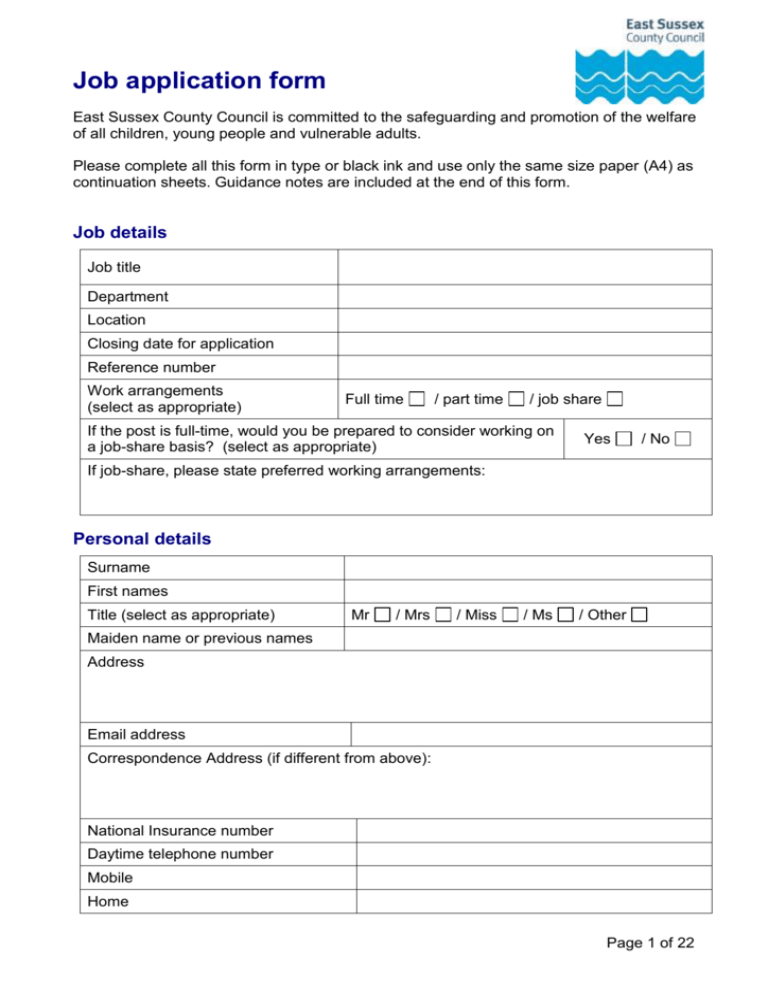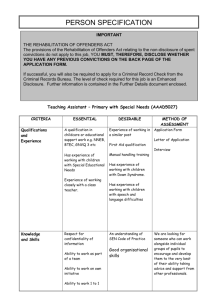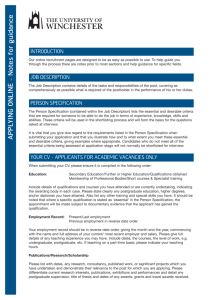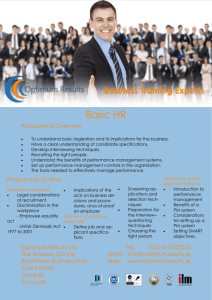Job application form - Willingdon Community School
advertisement

Job application form East Sussex County Council is committed to the safeguarding and promotion of the welfare of all children, young people and vulnerable adults. Please complete all this form in type or black ink and use only the same size paper (A4) as continuation sheets. Guidance notes are included at the end of this form. Job details Job title Department Location Closing date for application Reference number Work arrangements (select as appropriate) Full time / part time / job share If the post is full-time, would you be prepared to consider working on a job-share basis? (select as appropriate) Yes / No If job-share, please state preferred working arrangements: Personal details Surname First names Title (select as appropriate) Mr / Mrs / Miss / Ms / Other Maiden name or previous names Address Email address Correspondence Address (if different from above): National Insurance number Daytime telephone number Mobile Home Page 1 of 22 Present employment Job title Name and address of employer (including County) Date started current post Date commenced with employer Salary / wage / benefits Notice required Briefly describe your present job; its main purpose and your responsibilities: Are you currently employed by East Sussex County Council as an apprentice? Yes / No Previous employment Please list most recent first. Include permanent and temporary work, service with HM Forces, voluntary work, work experience and previous service with East Sussex County Council. Name & Address (including County and nature of business) From / To (exact dates) Position and Salary Reason for leaving Page 2 of 22 Education and qualifications From age 11 onwards, and please state whether full (F) or part (P) time Name of School, College, University etc From / To F/P Subjects studied (with grades and year taken) Training This includes government training schemes, apprenticeships, short courses, projects and secondments. Please also include trade/professional training and give date of completion. Course Title Organisation From / To Page 3 of 22 Membership of professional institutes Please indicate whether membership is by examination Institute Level of membership Year of Award Other Experience Please describe all time spent since leaving full-time education. Full details should be given for any period not accounted for by full-time employment, education and training. This would include e.g. unemployment or voluntary work. Please state this information in chronological order. Experience From / To Driving Licence Only answer if a full driving licence is an essential requirement of the job. Do you hold a current Driving Licence? (select as applicable) Yes / No Yes / No If YES, please state the type of licence you hold Do you have any current endorsements? (select as applicable) If YES, please specify: Page 4 of 22 Why should we employ you? Refer to 'Guidance Notes' for job applicants Please mention any specific skills or experience that meet the requirements of the job description and person specification. These skills may have been gained in relation to your current or previous employment, education, training, domestic activities, voluntary work or leisure interests. Page 5 of 22 Declaration by Applicant The Working Time Regulations 1998 Regulations on Working Time The Working Time Regulations were introduced on 1st October 1998 and working hours in the UK are now governed by statute. Department working practices and procedures are therefore organised to comply with the following legal requirements. (Average hours are normally calculated over a 17 week period.) Average weekly working hours are limited to 48 hours Average daily night working hours are limited to 8 hours Minimum daily, weekly and in-work rest breaks requirements Minimum requirements for annual leave. Department Policy and Procedures The legislation was introduced as a health and safety measure. Employers who do not comply with the limits to working time will be committing a criminal offence. Working practices in the department are therefore monitored to ensure that generally, working hours remain well within legal limits. Employers are required to take ‘all responsible steps’ to ensure that the limits to working time are not exceeded. This includes inquiring whether a person is working elsewhere. All applicants are therefore asked to declare all other employment. This declaration will not prejudice your application Please note: If you do have other job(s), your application will still be assessed on your suitability to do the job you are applying for. At this stage, any other jobs you declare will be ignored. If you are selected for interview the implications will be carefully discussed with you. The department may consider it necessary to discuss the situation with your other employer(s) but only with your permission. Depending on the overall situation and the outcome of discussions with you, the department would have the following options: not to offer you the appointment offer the appointment on reduced hours offer the appointment providing the other work is relinquished (or the hours reduced) offer the appointment and enter into an agreement with you to opt out of the weekly working time limit. Page 6 of 22 Employment which you intend to continue if successfully appointed to the post applied for. Please complete and sign either Section 1 or Section 2 below. Your application cannot be processed if you do not return this form. Please declare any other job, whether they are with the County Council, other local authorities, public bodies or with private companies/employers. Section 1 – No other employment I confirm that I do not have any other employment. Signature Print Name Date If form has been completed electronically please place an ‘x’ in this box in place of your signature Section 2 – Other Employment All other employment that I have is detailed below: Weekly hours must specify total regularly worked (including overtime) Please use 24-hour clock Job Title Weekly Hours Start Time End Time Signature Print Name Date If form has been completed electronically please place an ‘x’ in this box in place of your signature Page 7 of 22 References Please provide two references. One must be your present or last employer (where applicable) and the other, a second employer. If you have not been employed previously, please provide an academic and character reference. A job offer will not be made without 2 references. If you do not wish us to contact your referees prior to interview, please indicate as shown. Note: We reserve the right to seek references at any point in the recruitment process and from any previous employers listed in the ‘Previous Employment’ section of this form. For posts within Childrens Residential Services, employment references will be automatically sought even if you have stated 'no' in the 'may we contact' boxes below. Please contact us immediately if this is a cause for concern. Present/last employer Name Address Tel No: Occupation Email Address May we contact this referee prior to interview? (select as applicable) Yes / No Yes / No Have you ever been dismissed or have you ever resigned in the face of a dismissal or warning? (select as applicable) Yes / No Have you ever been the subject of any allegations in relation to the safety and welfare of children, young people and/or vulnerable adults, either substantiated or unsubstantiated? Yes / No Second referee or course tutor (if applicable) Name Address Tel No: Occupation Email Address May we contact this referee prior to interview? (select as applicable) Warnings and Disciplinary Issues If you have answered yes to the above question, you must supply details on a separate sheet of paper, place it in a sealed envelope marked confidential and attach it to your application form. I have attached details requested Yes / No Please list any disciplinary offences or warnings you have received at any time, or state if not applicable. Reason for warning Date Name/address of employer Page 8 of 22 Rehabilitation of Offenders Act 1974 You are required to declare any criminal convictions (including bind over and cautions) which are not “spent” in accordance with the Rehabilitation of Offenders Act 1974. Some of our posts carry exempt status under the provisions of the Act for which you are required to declare any convictions regardless of whether or not the time limit has elapsed. Please read the guidance notes before completing this section. For posts that are exempt under the Rehabilitation of Offenders Act 1974: Have you ever been convicted of a criminal offence? (select as applicable) Yes / No Are there any alleged offences outstanding against you? Yes / No Yes / No For all other posts: Do you have any criminal convictions which are not yet “spent”? If YES to any of the above, please give details below or, if you prefer, attach details in a sealed envelope marked 'strictly confidential'. Failure to disclose, in accordance with the guidance, any information relating to criminal convictions may disqualify your application or result in dismissal without notice. Declaration of Interests You are required to declare any relationships with Senior Officers or members of the County Council as canvassing, whether direct or indirect, will invalidate your application. (Please note Senior Officers are defined as Chief Officers or Deputy Chief Officers.) Are you a relative, partner or friend of anyone who currently works for or is a County Councillor for East Sussex County Council? Yes / No If ‘YES’, please give details (stating department and job title if quoting an employee): Do you undertake any activities and/or responsibilities in connection with management committees of voluntary organisations? Yes / No If YES, please give details: Page 9 of 22 Declaration I declare that the information given both on this application form and the attached equal opportunities monitoring form is true and correct. I understand that any false or misleading information, or omissions of information concerning canvassing or criminal convictions, may disqualify my application or may render my Contract of Employment, if I am appointed, liable to termination. Signed: Date Print name If form has been completed electronically please place an ‘x’ in this box to indicate your consent Data Protection Act 1998 East Sussex County Council will only process the information you have provided in this form for the purpose of recruitment and selection and, if you are successful in securing this position, for purposes relating to your employment. Your details will be kept both electronically and in hard copy. We will not disclose this information about you to outside organisations or third parties unless there is a legal requirement to do so, or for the prevention and detection of fraud. For further information, see www.eastsussex.gov.uk/dataprotection How to return your form For vacancies based in schools Please send your completed form direct to the school at the address stated in the job advert. For corporate, non schools-based vacancies Please send your completed application form to: Recruitment Support Team North F County Hall St Anne’s Crescent Lewes East Sussex BN7 1UE Or via email to recruitmentsupport@eastsussex.gov.uk Page 10 of 22 If you are returning your application by post, please ensure you use the correct postage for the size, weight and thickness of your envelope in line with the revised posting system introduced in August 2006. In the interests of economy an acknowledgement will be sent only if you supply a stamped addressed envelope. We look forward to receiving your application form. Page 11 of 22 CONFIDENTIAL: Equal Opportunities in Employment – Monitoring Form This section will be removed for monitoring purposes before the selection process begins and will not affect the consideration of your application. Everyone is unique owing to differences in age, gender, ethnic origin, religion, sexual orientation, ability etc. The County Council aims to treat these differences positively, recognising that diversity creates a strong, flexible and creative workforce. The County Council’s Equality of Opportunity in Employment Policy states that all applicants are to be treated fairly, and selection for appointment is to be based solely on a person’s ability to do the job. The County Council has a statutory duty to collect the information you provide on this form and it will assist us in ensuring fairness of treatment in appointment decisions, as statistical monitoring will show whether minority groups are being treated equitably. This information will not affect the consideration of your application. Job applied for Job No. or Ref (if applicable) Location How did you learn of this vacancy? Worthwhile work campaign Other Surname and initials Age Gender Date of Birth M /F Ethnic Origin This is the origin of your family rather than your nationality. For example, you could be British and your ethnic (family) origins could be any of the ones listed opposite, or a combination of them, or something more specific. Please identify your ethnic origin either by putting an ‘x’ in ONE of the boxes below or by giving your own description in the space provided. a. White British Irish Gypsy/Roma Traveller of Irish Heritage Any other White background b. Mixed White and Black Caribbean White and Black African White and Asian Any other mixed background c. Black or Black British Caribbean African Any other Black background If other, please specify: d. Asian or Asian British Indian Pakistani Bangladeshi Any other Asian background e. Other ethnic groups Page 12 of 22 Chinese Any other ethnic group Page 13 of 22 Disability Guidance Where an applicant has a disability and they meet the essential criteria of the post they are automatically shortlisted for interview. This positive action helps ensure people with disabilities get their fair share of jobs. The Equality Act 2010 says that a person is disabled if they have a mental or physical impairment or long term health condition which has a substantial adverse effect on their ability to carry out normal day-to-day activities. If you consider yourself to be disabled please let us know. We would appreciate advice on any assistance you may require or reasonable adjustments we might arrange to enable you to attend or participate in the interview, in compliance with the Equality Act 2010. Do you consider yourself to be disabled as set out in the Equality Act? (select as applicable) Yes / No If YES, please describe your disability. If you need any assistance to attend or participate in the interview, please give details. Religion Please identify your religion by putting an ‘x’ in ONE of the boxes below. Christian Buddhist Hindu Jewish Muslim Sikh Other religion No religion Prefer not to say Sexual Orientation Please identify your sexual orientation by putting an ‘x’ in ONE of the boxes below. Bisexual Gay man Gay woman / lesbian Heterosexual / straight Other Prefer not to say Gender Identity Is your gender identity the same as the gender you were assigned at birth? Yes No Prefer not to say Military Status Please identify your military status by putting an ‘x’ in the relevant box below, if required. Territorial Army Army Reservist Page 14 of 22 Employees with caring and parental responsibilities We value the contribution of carers, and we understand the additional pressures carers face in managing their work and caring responsibilities at the same time. Are you a carer? We consider a carer to be anyone who spends a significant proportion of their time providing unpaid support to family or friends. This could be caring for a partner, relative or friend who is ill, frail, disabled, or has mental health or substance misuse problems. Examples of caring activities A lot of people with caring responsibilities don’t identify themselves as being a carer. We consider you to be a carer if you provide: personal care such as help with bathing, washing, dressing, going to the toilet and administering medicines physical care such as help getting out of bed, walking, eating and feeding, getting out of the house and/or in the community and with shopping administrative support such as help with finances and filling in forms emotional support and company including listening, prompting, encouraging and raising confidence. According to the definition of a ‘carer’ given above, do you have caring responsibilities for an adult? Yes No Prefer not to say Are you a parent carer? The term parent carer means any person with parental responsibility for a child or young person with special educational needs or disability. It is an inclusive term and covers for instance foster carers, adoptive parents and other family members. According to the definition of a ‘parent carer’ given above, do you have caring responsibilities for a disabled child under the age of 18 years? Yes No Prefer not to say Page 15 of 22 Are you a parent? We define a parent as: a mother, father, adopter, guardian, special guardian, foster parent or private foster carer of the child or a person who has been granted a residence order in respect of a child, or a person married to, or the civil partner of the child's mother, father, adopter, guardian, special guardian, foster parent or private foster carer of the child or person who has been granted a residence order in respect of a child. Are you a parent of a child or children under the age of 17 years? Yes No Prefer not to say Data Protection Act 1998 East Sussex County Council will only process the information you have provided in this form for the purpose of recruitment and selection and, if you are successful in securing this position, for purposes relating to your employment. Your details will be kept both electronically and in hard copy. We will not disclose this information about you to outside organisations or third parties unless there is a legal requirement to do so, or for the prevention and detection of fraud. For further information, see www.eastsussex.gov.uk/dataprotection Page 16 of 22 Guidance on your application Your application form is an important part of our recruitment process – it is how we get to know you and assess your ability to do the job. It enables us to decide whether or not to shortlist you for interview and therefore plays a vital role in the recruitment process. We do not take into account any previous applications or prior knowledge of you. We also do not accept Curriculum Vitaes (CV’s) and ask all applicants to complete our application form. This is in line with our Equal Opportunities Policy and ensures that information about candidates is presented in a standard format. The exception to this is candidates with a disability where a CV might be the most convenient method of application. Applications from disabled candidates will also be accepted in braille, on cassette or on the Council’s large type application form. How we shortlist When we shortlist, we look at your experience, skills, knowledge, attainment and other information in line with the job description and person specification. You will find copies of these in your job pack. The job description outlines the main responsibilities and duties of the post, and a person specification outlines the skills, abilities, experience and qualifications that you require to fulfil these duties. Please ensure you read the job description and person specification before you begin to complete the form so you have in mind the skills and knowledge we are looking for. Applicants who are disabled under the provisions of the Disability Discrimination Act 1995 will be automatically shortlisted provided they meet the essential qualifications and experience required by the post. How to complete your application form General hints Read the job description and person specification before you start Use black ink so we can clearly photocopy forms for shortlisting and interviewing Complete all sections of the form as fully as possible Clearly label and number any continuation sheets with your name and the post you are applying for and list the number of attachments on the main application form. This allows us to check we have all the information you want us to have before we shortlist. Keep a copy of the application form for your own records. ‘Why should we employ you?’ This is the most important part of the form and is your opportunity to show us how you meet the essential and desirable criteria detailed in the person specification and job description i.e. how your skills, knowledge and experience match those we require and how they will enable you to successfully do the job. Use the criteria in the person specification as headings and give examples of your experience and skills under each heading. You can use skills you have gained from community and voluntary work, leisure interests and your home life, as well as those from your past and present employment. Use clearly labelled continuation pages if required. Page 17 of 22 Check you have demonstrated how you meet all the essential requirements on the person specification. The shortlisting panel cannot guess or make assumptions about your work experience. Remember that we use the job description and person specification to shortlist – if you do not therefore clearly demonstrate how you meet the essential criteria in the person specification – you will be shortlisted to interview. References (Page 8) We will contact your references prior to interview unless you have ticked the boxes on the application form indicating not to. References will not be used as part of the interview process, but will be taken into account if you are offered the post. We must receive two satisfactory references about you before we can formally offer you the post. "Confidential - for the attention of the Personnel Officer" All information provided on a "Confidential - for the attention of the personnel officer" basis is usually withheld from the recruitment and selection panel until shortlisting is complete. The information is made available to the panel for the interview and you should anticipate being asked about it. Rehabilitation of Offenders The Council requires all applicants to disclose criminal convictions. Some posts require information relating to both "spent" and "unspent" convictions whereas other posts require "unspent" information only. Applicants who have been shortlisted for posts involving regular contact with children or vulnerable adults will be required to apply for either a standard or enhanced disclosure from the Criminal Records Bureau. See the enclosed "Rehabilitation of Offenders Act 1974 Guidance Notes" (below). Declaration of Interests Direct or indirect canvassing of Councillors or Senior Officers by, or on behalf of yourself is forbidden. If you are related to a Councillor or Senior Officer record the details in a sealed envelope and mark it "Confidential - For the attention of the Personnel Officer". Equal Opportunities in Employment Monitoring Form The Council has an Equal Opportunities in Employment Policy. One of its aims is to ensure that unfair discrimination does not occur in recruitment and in order to help the Council monitor the effectiveness of this Policy (and for no other reason) an Equal Opportunities in Employment Monitoring Form is attached to the Application Form. Completion of this will help us to ensure that we provide the highest standard of service to job applicants. Disability Guidance The Disability Discrimination Act 1995 states that “a person has a disability for the purposes of this Act if he has a physical or mental impairment which has a substantial and long-term adverse effect on his ability to carry out normal day-to-day activities”. What do I do now? Once your application form is completed and you are happy that you have provided all the information we require to shortlist, please send your application to the address shown on the application form. Please enclose a stamped, self-addressed envelope or postcard if you would like receipt of your application form to be acknowledged. Page 18 of 22 Other important information… Data Protection Statement Under the Data Protection Act 1998, the information you provide in your job application form will be treated confidentially at all times and will only be disclosed to personnel involved in the recruitment process. Recruitment decisions will be made by a staff panel and not solely on the basis of automated decision making. If you accept a post with the County Council, your personal information will be held for purposes relating to your Contract of Employment. Security safeguards apply to both manual and computerised information, and only relevant personnel and managerial staff can access your information. If your application is unsuccessful, your application form and any other information we hold about you will usually be destroyed after six months. Personal information for all applicants may be retained for monitoring and future recruitment purposes. Evidence of Qualifications If invited to interview, you will be required to provide evidence to prove that you hold the qualifications, which are relevant to the appointment. If the post requires you to travel on official business you will be required to produce your drivers licence and certificate of insurance to your manager for inspection upon appointment. Health Statement Where an appointment is offered, you will be required to complete a health questionnaire which must be cleared by the County Council’s Occupational Health Adviser prior to taking up your post. You may also be required to have a medical examination or give permission for the Occupational Health Adviser to contact your GP for a report. Staff moving internally will be required to complete a health questionnaire if the new post is significantly different. Asylum and Immigration Act 1996 It is a criminal offence to employ persons whose immigration status prevents them from working in this country. The Act does not affect citizens of the UK, Ireland, European Economic Area and the Commonwealth, provided they have the right to abode in the UK. You will be required, if appointed, to provide evidence that you are entitled to work in this country. Official confirmation of your national insurance number on a P45, P60, plastic NI number card, former payslip or a letter from the Inland Revenue or other Government Department can be provided; alternatively, a list of acceptable documents is available on request. Applications to Job Share If you are applying on a job share basis, please indicate this on the application form, and as far as possible, the working sessions that you would prefer. This enables us to match you with other job share applicants who have indicated complementary working sessions. Please remember that the more you restrict the working sessions available to you, the more difficult it will be for us to find you a partner. Therefore, try and be as flexible as possible. Page 19 of 22 Interview Expenses The County Council does not normally pay interview expenses. We do, however, recognise that there may be occasions when candidates require assistance. Please contact the Personnel Section if you require such assistance, before incurring any expense. The Rehabilitation of Offenders Act (1974): Guidance Notes Please read these guidance notes carefully before completing the section on the Rehabilitation of Offenders Act 1974 on the Application Form. Disclosure of Criminal Convictions Under this Act you are required to disclose details of previous convictions, until a certain length of time passes and the convictions become “spent”. Under the above Act you do not need to provide details about either minor motoring offences or previous convictions once they become “spent”. This includes the date you sign the application form. Please note the following when considering whether a conviction is spent:i. ii. iii. iv. “spent” periods are halved if the conviction took place when you were aged 17 or less; a sentence of longer than 2½ years in prison will never become “spent”; a sentence of preventive detention and a sentence of detention during Her Majesty’s pleasure is never “spent”; or it is immaterial for the process of calculating a “spent” conviction whether the sentence is suspended or not. The information you provide will be treated strictly confidentially. Having a conviction will not necessarily bar you from employment. This will depend on the circumstances and background to the offence(s) which will be taken into account when considering how suitable you are for the type of work involved, should your application be successful. Failure to disclose any “unspent” convictions may result in the offer of employment being withdrawn. If already appointed, you could be dismissed without notice. Please see the list below which details the rehabilitation periods for criminal convictions. Criminal Convictions and Time Periods before Becoming “Spent” Sentence Become spent after For a sentence of imprisonment or youth custody exceeding six months but not exceeding two and a half years. For a sentence of imprisonment or youth custody not exceeding six months. For a sentence of Borstal training. For a fine or other sentence under this Act, not otherwise covered in this table. 10 years 7 years 7 years 5 years Page 20 of 22 For an absolute discharge. For a probation order, conditional discharge or bindover, fit person orders, supervision order or care order under the Children and Young Persons’ Acts (and equivalent in Scotland). For cashiering, discharge with Ignominy or dismissal with disgrace from Her Majesty’s Service. For dismissal from Her Majesty’s Service. Any sentence of detention in respect of a conviction in service disciplinary proceedings. For detention by direction of Home Secretary: for a period exceeding six months but not exceeding two and a half years. for a period not exceeding six months. for a detention centre order. for a remand home order, an approved school order or attendance centre order. for a hospital order under the Mental Health Acts. 6 months 1 year or until the order expires (whichever is the longer) 10 years 7 years 5 years 5 years 3 years 3 years The period of the order plus a further year after the order expires The period of the order plus a further 2 years after the order expires. (With a minimum of 5 years from the date of conviction.) Exemptions under the Rehabilitation of Offenders Act There are specific job categories and classes of employment which are exempt under the provisions of the Act. This means that convictions never become “spent” for work in these categories. Therefore, if you are applying for a position which falls within one of the work categories listed below you will need to declare any convictions you have had regardless of whether or not the time limit has elapsed. The areas of employment which carry exempt status are as follows: Work involving matters of National Security. Judicial appointments. Employment in the office of the Director of Public Prosecutions. Employment in the office of Procurator Fiscal or District Court Prosecutor or in the Crown Office. Justices’ Clerks and Justices’ Clerks’ Assistants. Constables, Police Cadets, Military Naval and Airforce Police and certain posts involving police work or assisting the police. Employment in the Prison Service including appointment to the Board of Visitors. Traffic Wardens. Probation Officers. Certain professions with legal protection such as barristers, solicitors, accountants or nurses. Any office or employment concerned with the provision of persons aged under 18 years to accommodation, care, leisure and recreational facilities, schooling, social services, supervision or training, being an office or employment of such a kind as to Page 21 of 22 enable the holder to have access, in the course of their normal duties which are carried out wholly, or partly, on the premises where such provision takes place. Employment connected with the provision of Social Services which involves the young, those over 65 years, the mentally or physically handicapped, chronically sick, disabled, or people who are addicted to drugs or alcohol. Employment connected with the provision of services to vulnerable adults i.e. accommodation and nursing or personal care in a care home or within a vulnerable adult’s home or services provided in an establishment catering for a person with learning disabilities. Employment concerned with the provision of health services, within the National Health Service or otherwise, which involve access to patients. Any occupation that concerns the management of an abortion clinic or of a private hospital or nursing home. Any occupation concerned with the management of an establishment for which registration is required by Section 37 of the National Assistance Act 1948. Any occupation for which a Certificate of Fitness to keep explosives is required. Firearms dealer. Any occupation requiring a licence, certificate, or registration from the Gaming Board of Great Britain. Director, controller, or manager of an insurance company. Page 22 of 22








![Application_trained_nurse[1] - Diversity Care Solutions Ltd](http://s3.studylib.net/store/data/006630267_1-c8ad234c03d998d961d0e759e03f1600-300x300.png)